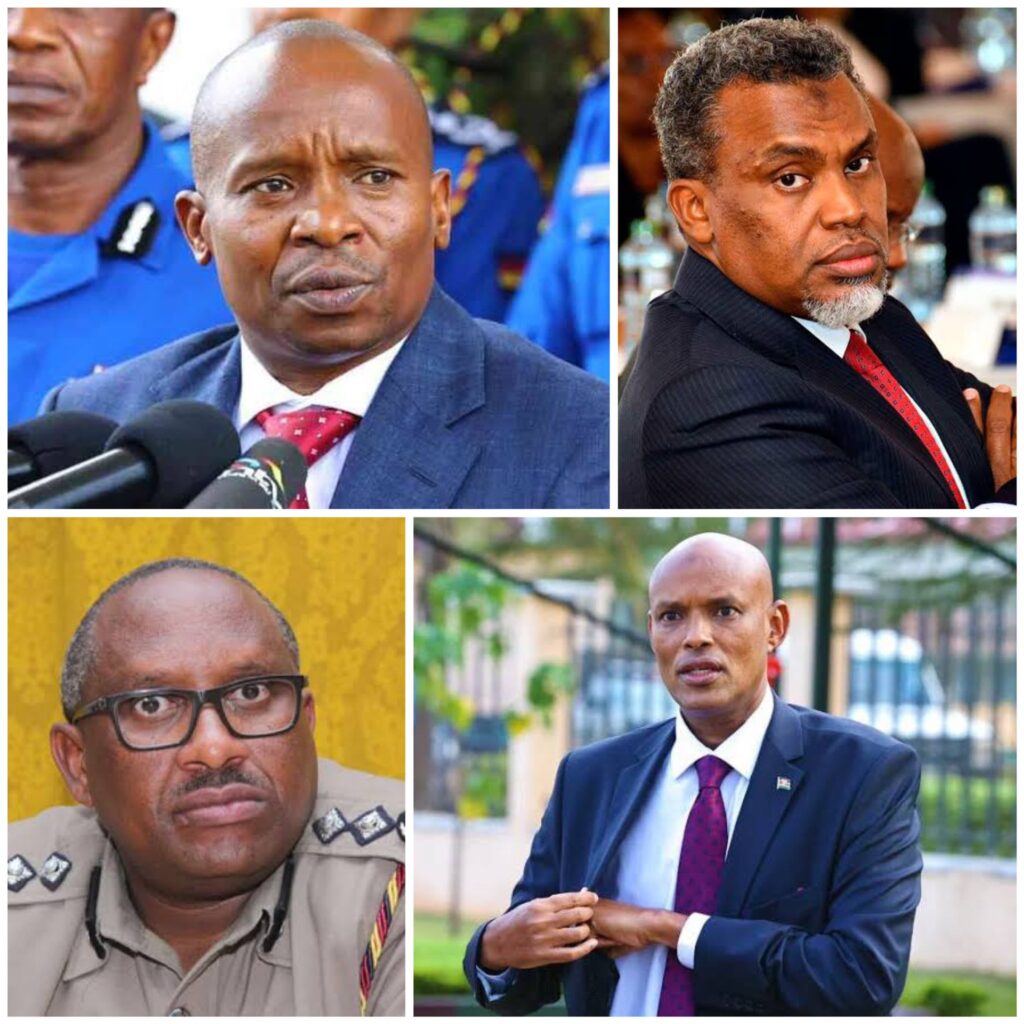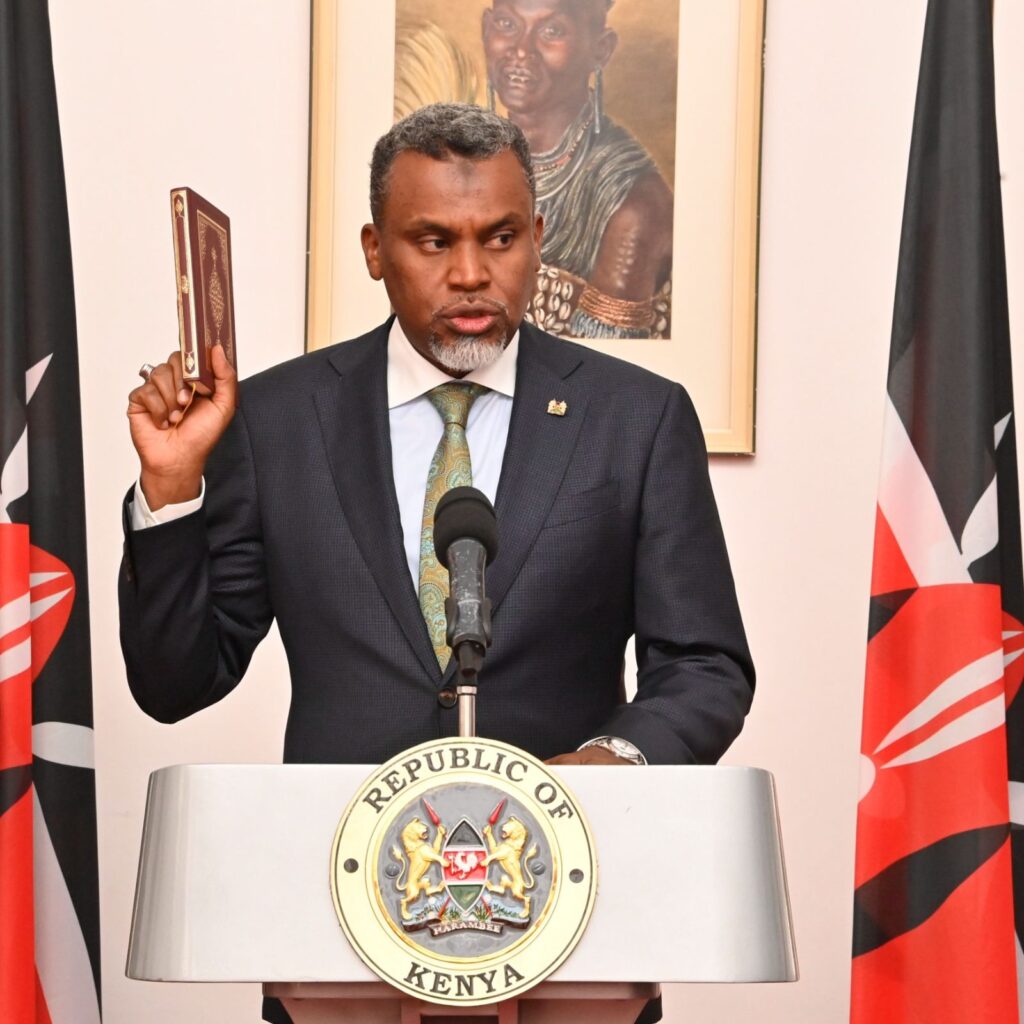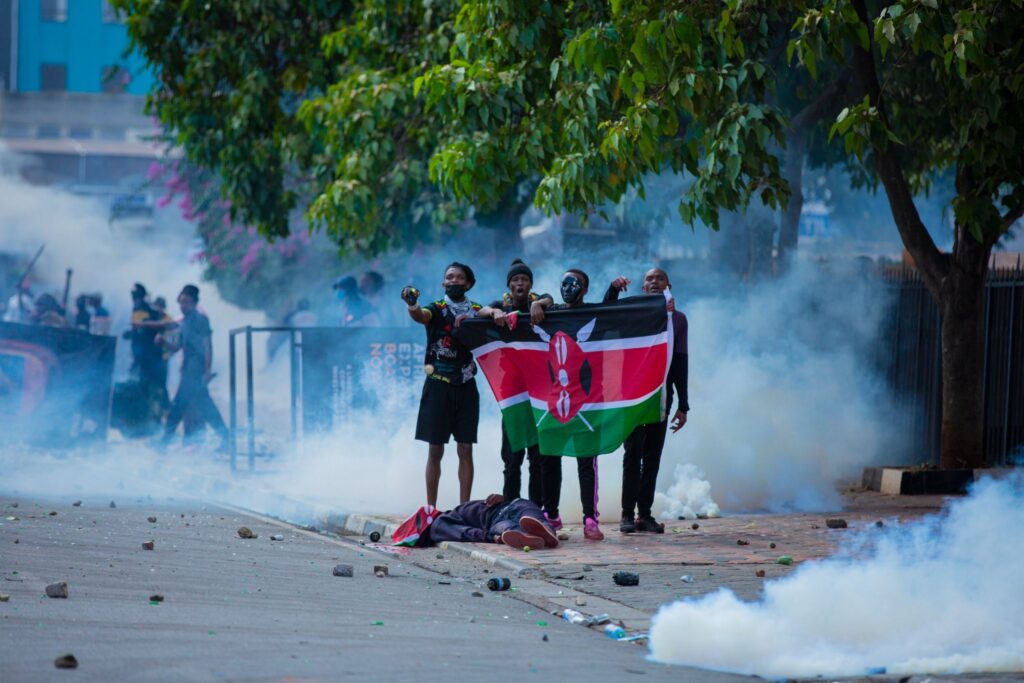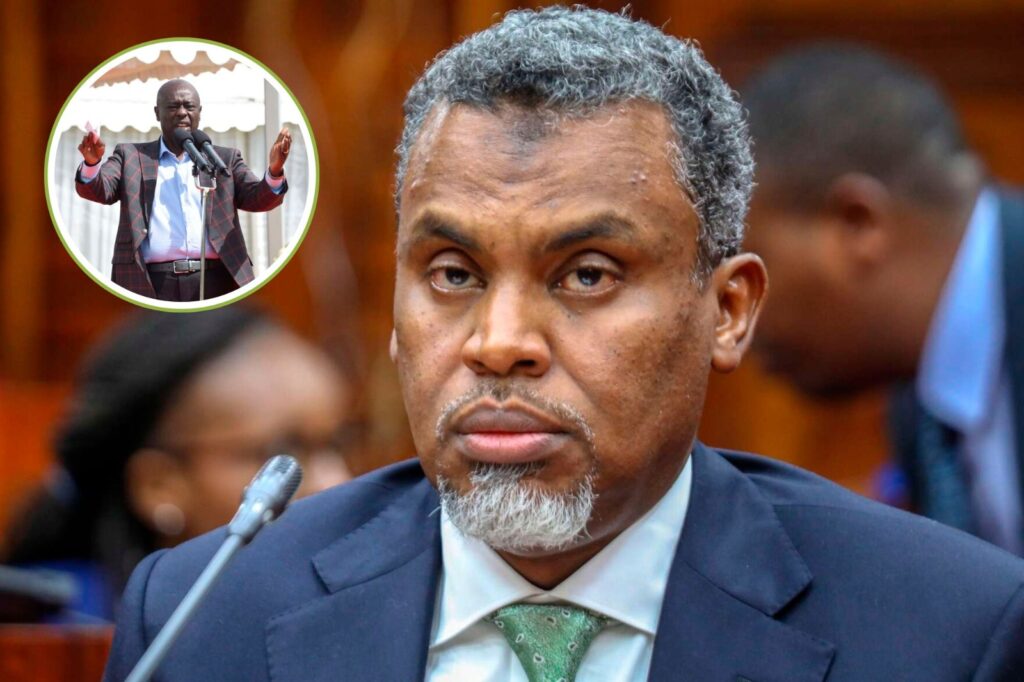
Introduction
In recent weeks, Kenya has found itself at the epicenter of a political and social storm that has shaken the very foundations of its democratic institutions. The catalyst for this upheaval was the controversial Finance Bill 2024, a piece of legislation that ignited widespread discontent among citizens, particularly the youth. What began as peaceful demonstrations quickly escalated into deadly protests, exposing not only the deep-seated frustrations within the populace but also significant failures within the country’s intelligence and security apparatus.

This blog post aims to provide a comprehensive analysis of the multifaceted issues surrounding these events. We will delve deep into the role of the National Intelligence Service (NIS), examine the government’s response to the crisis, and explore the complex path forward for a nation standing at a critical juncture in its history. Through this exploration, we hope to shed light on the challenges facing Kenya and the potential solutions that could lead to a more stable and prosperous future.
The NIS Failure: A Critical Lapse in National Security
At the heart of the recent crisis lies a startling failure of Kenya’s National Intelligence Service (NIS). This failure has been brought into sharp focus by the pointed criticisms of Deputy President Rigathi Gachagua, who has not minced words in his assessment of the NIS’s performance, particularly under the leadership of its Director General, Noordin Haji.
The primary function of any national intelligence service is to serve as the eyes and ears of the government, providing crucial information that aids in decision-making at the highest levels. In this instance, it appears that the NIS fell far short of its mandate, failing in several key areas:
- Failure to Anticipate Public Reaction: Perhaps the most glaring oversight was the NIS’s inability to gauge the depth and intensity of public sentiment regarding the Finance Bill 2024. A competent intelligence service should have been able to predict the potential for widespread unrest and advise the government accordingly. This failure suggests a significant disconnect between the intelligence community and the pulse of the nation.
- Inadequate Risk Assessment: The inability to accurately assess the risk of violence and property destruction points to a serious gap in the NIS’s analytical capabilities. Effective intelligence work involves not just gathering information, but also interpreting it within the context of social, economic, and political realities. The NIS’s failure in this regard raises questions about the quality of its analytical processes and the expertise of its personnel.
- Lack of Actionable Intelligence: Even if the NIS had gathered relevant information, it appears that this intelligence was not effectively communicated to President William Ruto and other key decision-makers in a timely manner. This breakdown in communication represents a critical failure in the intelligence cycle, rendering even the best information useless if it doesn’t reach those who need it most.
- Inability to Provide Strategic Foresight: Beyond the immediate crisis, the NIS seems to have failed in providing the government with strategic foresight into the long-term implications of its policies. This lack of forward-thinking intelligence leaves the government vulnerable to repeating similar mistakes in the future.
These failures raise serious questions about the current state of Kenya’s intelligence apparatus and its ability to safeguard national security interests. In an era where information is power, the inability of the NIS to effectively gather, analyze, and disseminate crucial intelligence represents a significant vulnerability for the nation.
The Leadership Question: Noordin Haji Under Scrutiny
At the center of this controversy is Noordin Haji, the Director General of the NIS. Deputy President Gachagua has been particularly scathing in his criticism of Haji’s leadership, accusing him of systematically weakening the service by removing experienced senior officers. This purge, according to Gachagua, has left the NIS dysfunctional and unable to fulfil its critical role in national security.







The allegations against Haji are serious and multifaceted:
- Dismantling of Institutional Knowledge: By removing seasoned officers, Haji may have inadvertently stripped the NIS of valuable experience and expertise crucial for effective intelligence gathering and analysis. In the world of intelligence, institutional memory and long-standing networks of informants are invaluable assets that cannot be easily replaced.
- Weakening of Operational Capabilities: The loss of key personnel could have severely impacted the NIS’s ability to maintain its networks of informants and analyze complex situations. Intelligence work often relies on long-standing relationships and deep understanding of local contexts, both of which may have been compromised by the removal of experienced officers.
- Failure of Leadership: As the head of the NIS, Haji bears ultimate responsibility for the organization’s performance. The recent failures suggest a significant lapse in leadership and strategic direction. A leader in such a critical position must not only manage personnel effectively but also foster an environment that encourages the free flow of information and robust analysis.
- Politicization of Intelligence: There are concerns that the removal of senior officers may have been politically motivated, raising questions about the independence and objectivity of the NIS under Haji’s leadership. The politicization of intelligence agencies is a dangerous trend that can undermine their effectiveness and credibility.
- Lack of Accountability: The fact that such significant failures could occur without immediate consequences speaks to a larger issue of accountability within Kenya’s security apparatus. In many democracies, such a lapse would lead to immediate calls for resignation or dismissal.
Given the gravity of these failures and their consequences, there have been calls for Haji to take responsibility and resign from his position. The argument is that President Ruto and the nation at large deserve a more competent Director General who can restore the NIS to its former effectiveness and ensure that it fulfills its crucial role in safeguarding national security.
The Human Cost: Lives Lost and Families Shattered
While the failures of intelligence and leadership are significant, it’s crucial not to lose sight of the human tragedy at the heart of this crisis. The protests against the Finance Bill 2024 turned deadly, resulting in the loss of young lives and leaving families devastated. Deputy President Gachagua has expressed deep empathy for these families, acknowledging the profound pain and sorrow they must be experiencing.
The loss of life in these circumstances is particularly tragic for several reasons:
- Youth at the Forefront: Many of those who lost their lives were young people, representing a loss not just to their families but to the nation’s future. The death of young individuals in political protests is especially poignant, as it often represents the silencing of voices that were seeking to shape their country’s future.
- Preventable Deaths: With proper intelligence and government preparation, these deaths might have been avoided, adding to the sense of futility and anger. The knowledge that better governance and more effective security measures could have prevented these tragedies adds an extra layer of pain for the families and communities affected.
- Societal Impact: The deaths of protesters can further inflame tensions and create a cycle of mistrust between the government and its citizens. Each life lost becomes a rallying point for further dissent, potentially escalating the conflict and making peaceful resolution more difficult.
- Long-term Trauma: Beyond the immediate loss, the families and communities affected by these deaths will carry the trauma for years to come. This collective trauma can shape political attitudes and social dynamics for generations.
- Economic Impact on Families: In many cases, the young people who lost their lives may have been breadwinners or held the promise of future financial support for their families. Their loss therefore represents not just an emotional blow but also a significant economic setback for their loved ones.
- Educational Losses: If students were among those killed, their deaths represent a loss of investment in human capital that the country has made through its educational system. This is a loss not just to their families but to the nation’s future intellectual and professional capacity.
The human cost of these events underscores the urgent need for better governance, improved intelligence, and more effective mechanisms for addressing public grievances before they escalate to violence. It also highlights the critical importance of protecting the right to peaceful protest while maintaining public order and safety.
Property Destruction and Economic Impact
Beyond the tragic loss of life, the protests also resulted in significant destruction of property. This aspect of the unrest has both immediate and long-term implications for Kenya’s economy and social fabric:
- Economic Losses: Damaged businesses and infrastructure represent a direct economic loss and will require substantial resources to rebuild and repair. Small businesses, often the backbone of local economies, are particularly vulnerable to such destruction and may struggle to recover.
- Investment Climate: Widespread unrest and property destruction can deter both domestic and foreign investment, potentially slowing economic growth. Investors typically seek stability and predictability, and scenes of violence and destruction can shake confidence in a country’s economic prospects.
- Social Cohesion: The destruction of property can create divisions within communities and erode the sense of security necessary for a stable society. It can lead to a breakdown of trust between different segments of society, particularly if certain areas or communities are disproportionately affected.
- Insurance and Financial Implications: Many businesses may not have adequate insurance coverage for civil unrest, leading to significant financial losses. This can have ripple effects throughout the economy, affecting employment and economic activity.
- Strain on Public Resources: The need to repair public infrastructure and provide support to affected businesses puts additional strain on government resources, potentially diverting funds from other crucial areas of development.
- Tourism Impact: Kenya’s tourism industry, a significant contributor to the economy, can be severely affected by images of unrest and destruction. The perception of instability can lead to cancellations and a decline in future bookings.
- Supply Chain Disruptions: Damage to businesses and infrastructure can disrupt supply chains, leading to shortages of goods and services and potential price increases for consumers.
While condemning the violence and destruction, it’s important to recognize that these actions often stem from deep-seated frustrations and a sense of powerlessness among certain segments of the population. The destruction, while unjustifiable, is often a symptom of broader societal issues that need to be addressed.
Addressing the root causes of this discontent is crucial for preventing future outbreaks of violence. This requires a multifaceted approach that includes:
- Improving economic opportunities, particularly for youth
- Enhancing transparency and accountability in governance
- Strengthening mechanisms for peaceful expression of grievances
- Investing in education and skills development
- Promoting inclusive economic growth that benefits all segments of society
By addressing these underlying issues, Kenya can work towards creating a more stable and prosperous society where citizens feel heard and valued, reducing the likelihood of future unrest.
The Finance Bill 2024: Understanding the Catalyst
At the heart of the recent unrest was the controversial Finance Bill 2024. To fully grasp the situation, it’s essential to understand the contents of this bill and why it sparked such vehement opposition:
- Tax Increases: The bill proposed several new taxes and increases to existing ones, which many Kenyans felt would further burden an already struggling populace. Some of the key tax measures included:
- An increase in the Value Added Tax (VAT) on fuel from 8% to 16%
- Introduction of a 3% turnover tax on small businesses
- Increase in capital gains tax from 5% to 15%
- Housing Fund Levy: A particularly contentious aspect was the proposed mandatory housing fund levy, which many saw as an unfair additional tax on formal sector employees. The levy proposed a 3% contribution from both employers and employees, with a matching contribution from the government.
- Digital Service Tax: The bill sought to introduce a digital service tax of 1.5% on the gross transaction value of digital services, which could potentially increase costs for consumers of online services.
- Excise Duty Increases: Various excise duties were proposed to be increased, including those on bottled water, alcoholic beverages, and tobacco products.
- Changes to Income Tax: The bill proposed changes to personal income tax bands, which, while providing some relief to lower-income earners, was seen as not going far enough in addressing income inequality.
- Environmental Levy: A new environmental levy was proposed on all imported goods, which critics argued could lead to increased prices for consumers.
The government’s rationale for the bill was multifaceted:
- Revenue Generation: The primary aim was to increase government revenue to fund development projects and reduce the country’s debt burden. Kenya has been grappling with a significant budget deficit and growing public debt.
- Housing Development: The housing fund levy was intended to support the government’s affordable housing program, one of the key pillars of President Ruto’s election promises.
- Digital Economy Taxation: The digital service tax was aimed at capturing revenue from the growing digital economy, which has often been difficult to tax effectively.
- Environmental Conservation: The environmental levy was presented as a measure to promote sustainability and fund environmental conservation efforts.
However, the manner in which these measures were introduced and the perceived lack of public consultation contributed to the widespread opposition. Many Kenyans felt that:
- The timing was poor, given the already challenging economic conditions many were facing due to high inflation and unemployment rates.
- The burden of new taxes would fall disproportionately on the poor and middle class, exacerbating income inequality.
- There was insufficient explanation of how the additional revenue would be used and how it would benefit ordinary citizens.
- The bill was rushed through without adequate public participation and debate.
- Some measures, like the housing fund levy, were seen as unfair to those who already owned homes or had no intention of participating in the government’s housing scheme.
The controversy surrounding the Finance Bill 2024 highlights the delicate balance governments must strike between raising necessary revenue and maintaining public support. It also underscores the importance of clear communication, stakeholder engagement, and consideration of the broader economic context when introducing significant fiscal changes.
Government Response and the Withdrawal of the Bill
In the face of mounting pressure and escalating violence, President William Ruto made the significant decision to withdraw the Finance Bill 2024. This move was seen as a major concession to public demands and an attempt to restore calm to the nation. The withdrawal of the bill highlights several important points:
- Responsive Governance: The decision to withdraw the bill demonstrates the government’s willingness to listen to public sentiment, even if belatedly. This responsiveness is a crucial aspect of democratic governance, showing that public opinion can influence policy decisions.
- Political Pragmatism: Recognizing the potential for further unrest, the withdrawal can be seen as a pragmatic move to stabilize the political situation. It shows a level of flexibility in governance and an understanding that sometimes, stepping back is necessary to move forward.
- Need for Better Communication: The entire episode underscores the importance of clear communication and public engagement when introducing significant policy changes. The government’s initial failure to adequately explain the bill and its implications contributed to the misunderstandings and opposition.
- Economic Challenges Remain: While the withdrawal of the bill may have defused immediate tensions, the underlying economic challenges that necessitated its introduction still need to be addressed. The government now faces the difficult task of finding alternative ways to increase revenue and manage the country’s fiscal challenges.
- Power of Public Protest: The success of the protests in achieving the withdrawal of the bill demonstrates the power of collective action. However, it also raises questions about the balance between street protests and institutional channels for expressing dissent.
- Impact on Government Credibility: While the withdrawal may have eased tensions, it could also be seen as a sign of weakness or poor planning on the part of the government. Rebuilding public trust and credibility will be crucial moving forward.
- Legislative Process Review: The controversy surrounding the bill may prompt a review of the legislative process, particularly in terms of public participation and the speed at which bills are passed.
- Coalition Dynamics: The episode likely put strain on the ruling coalition, as different factions may have had varying views on how to handle the crisis. Managing these internal dynamics will be crucial for the government’s stability.
The withdrawal of the bill has been met with relief by many Kenyans, but it also raises questions about how the government will navigate the economic challenges that lie ahead without the additional revenue the bill was intended to generate. Some key considerations include:
- Alternative Revenue Sources: The government will need to explore other ways to increase revenue, potentially through more targeted and less controversial measures.
- Expenditure Review: There may be a renewed focus on reducing government expenditure and improving efficiency to manage the budget deficit.
- Economic Stimulus: To address concerns about economic hardship, the government may need to consider measures to stimulate economic growth and job creation.
- Debt Management: With the revenue-raising measures off the table, for now, the government will need to revisit its debt management strategy.
- Social Protection: There may be a need to strengthen social protection measures to support vulnerable populations who are struggling with economic challenges.
The withdrawal of the Finance Bill 2024 marks a critical moment in Kenya’s recent political history. It demonstrates both the power of public opinion and the challenges of governance in a complex economic environment. Moving forward, the government will need to balance fiscal responsibility with social sensitivity, and find ways to build consensus around necessary economic reforms.
Appeal for Calm and Dialogue
In the wake of these tumultuous events, Deputy President Rigathi Gachagua has made a passionate appeal for calm and dialogue. His call to the youth, particularly Generation Z, to call off planned protests acknowledges that their voices have been heard with the withdrawal of the Finance Bill. This appeal for restraint is crucial for several reasons:
- Preventing Further Violence: By calling for an end to protests, the government hopes to prevent any further loss of life or destruction of property. This is paramount for restoring a sense of normalcy and security across the nation.
- Creating Space for Dialogue: A calm environment is necessary for meaningful engagement between the government and citizens to address underlying issues. Without the immediate pressure of ongoing protests, both sides can approach discussions more rationally and constructively.
- National Healing: After a period of intense conflict, the country needs time to heal and rebuild trust between various segments of society. This includes not only trust between the public and the government but also between different communities that may have been divided by the unrest.
- Focus on Solutions: With protests suspended, both







